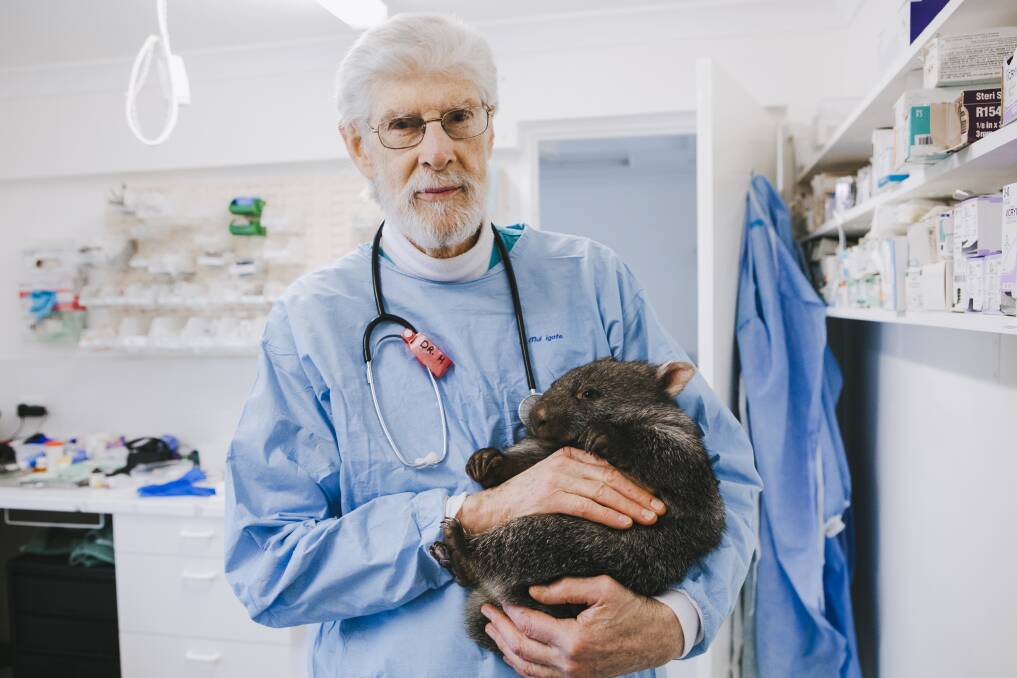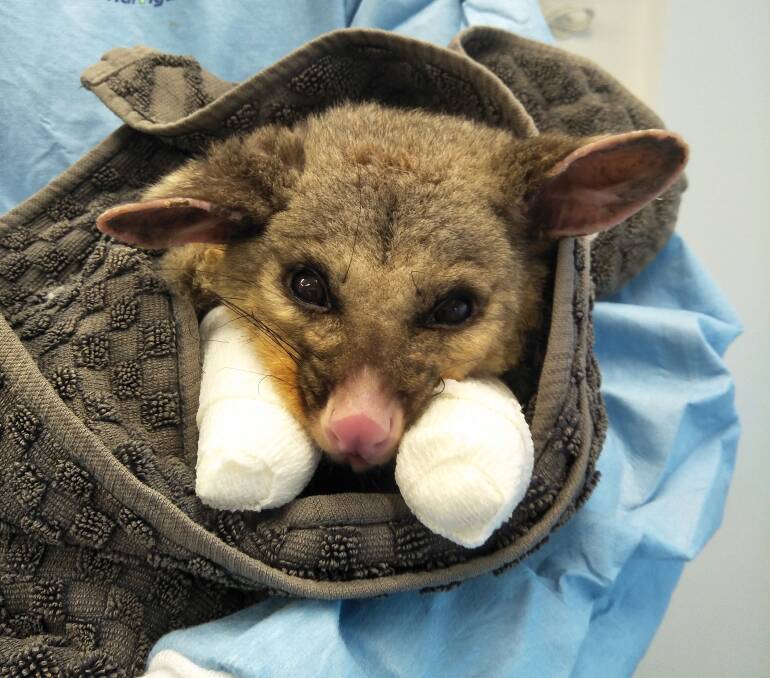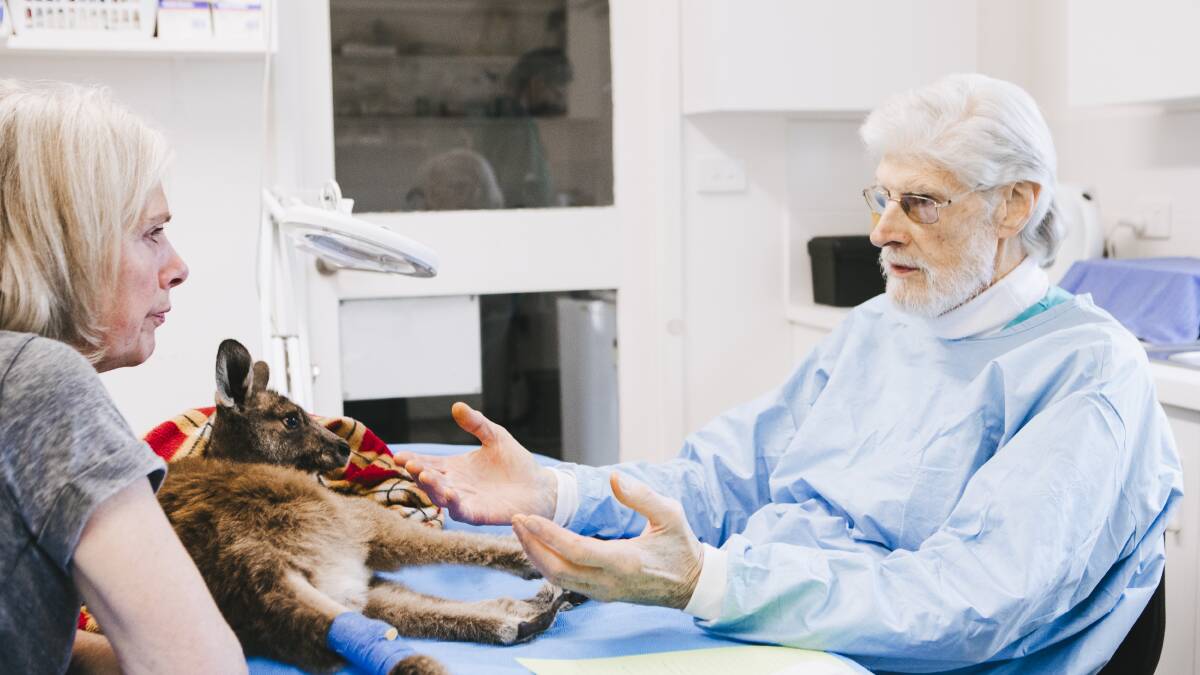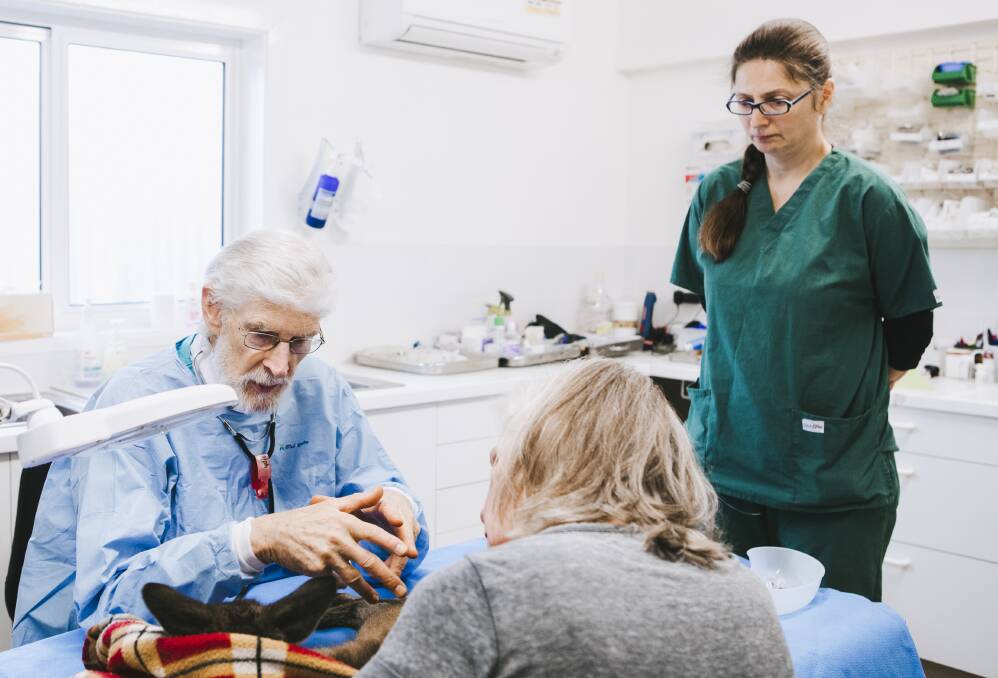Howard Ralph has rescued animals from bushfires, floods and cyclones and has dedicated his life to serving native wildlife.
Subscribe now for unlimited access.
or signup to continue reading
He's been very busy lately, with casualties from the fires. If by some stroke of luck the animals haven't been burnt, they're beginning to starve from their food sources being razed.
People bring the animals in their care to him because they know he'll do everything he can to keep them alive, and if there's no hope, he will give them medication for their pain before putting them out of their misery.
He works as a doctor in the local hospital to fund the veterinary service he runs for free from his home in the countryside between Braidwood and Bungendore.

Dr Ralph has travelled the world treating animals, and is a port of call for expert advice in treating wildlife for people in Australia and abroad.
He treats every patient in his wildlife veterinary clinic with sincere respect, compassion and professionalism. When asked if he prefers treating humans or animals, the answer is clear from the look in his eyes. The cruelty perpetuated by humans on native animals he's treated has taken a toll, he says.
"I'll treat anybody, be they wombats or humans," Dr Ralph says.
"Wildlife came first. I did veterinary medicine at university and I thought it was ridiculous treating all species except one, so I went back and did human medicine so now I can treat everybody. I've been practising both ever since."
"I treat human primates and that gives me an income. I can't not do something that provides an income, otherwise everything would stop."
Most of Dr Ralph and his wife Glenda's income goes into their clinic.
"There's a lot of maintenance, things that break down. Cars have to be paid for, the drugs have to be paid for, the rates have to be paid. Being alive incurs some cost."
All of the clinic's staff, mostly trained veterinary nurses, are volunteers. The Ralph's charity, Southern Cross Wildlife Care, receives community donations to help cover some of the necessities.
But it's not easy work, and it's Dr Ralph recalls a time when electricity prices spiked and they almost had to close. He thinks it inevitable that without more support, one day the costs will overrun them and the clinic will be no longer. Until that day, he says they would never compromise treatment because of the cost.
And that's why despite the many complex cases that come in, most of the animals survive.
"We treat them with respect, dignity and we do the very best we can with every patient, most of our patients do well," he says.
Like an endangered female burrowing frog from Queensland that was brought to him with a broken leg. He surgically put a pin in the leg, the frog survived and it was released back into the wild with the hope it would continue breeding.
Response to bushfires
Throughout the bushfire crisis Dr Ralph has been busy every night, and in this week of cool reprieve, he's been on the road with a small team to visit bushfire-affected areas and wildlife carers to provide veterinary advice.

While some people see some native wildlife, particularly kangaroos or possums, as a pests or a problem, Dr Ralph sees each one as an individual that doesn't deserve to be suffering or in pain.
He says occasionally he has to euthanise, if the injuries are too bad to treat. But just as humans are treated, so too are the animals in his care.
Dr Ralph says Australian wildlife have suffered "the ravages of neglect" over the years.
"Treating wildlife with casual disregard I regard as cruelty by neglect and that's unacceptable as well. They are living creatures, they are sentient beings, they're not made of plastic after all, and they deserve to be treated that way."
'Miracles happen beyond this gate'
In the waiting room of Dr Howard's clinic when we visit, which is before the fires have truly taken hold, there is a wombat named Pete with a broken toe who was hurt in a fox trap. Two joeys, one with a stomach bug, are with a young wildlife carer. Some baby wombats are tucked warmly inside knitted garments. A wallaroo hops around in the next room.

The people waiting to be seen have travelled hours to get there, with two, three, sometimes four animals each.
In the consultation room, a young joey named Karl is having difficulty breathing. His carer sits on one side of the table, petting the creature whose eyes are wide in fright and suffering. Dr Ralph is in the process of working out what's wrong.
"We've put in a drip and taken some blood. We're going to do a chest x-ray," Dr Ralph says.
"If it gets any worse, he will go in on the oxygen.
"Let's keep you calm, kiddo," he tells the joey.

Karl was orphaned after his mother was hit by a car. Kersten Schweth took him in. She has been a wildlife volunteer for 12 years, and travelled for two hours from the Southern Highlands to visit Dr Ralph. When she moved to Australia from Germany, she couldn't understand how people could treat the "beautiful animals" so poorly.
"We hope we can make a difference," Ms Schweth says. And to Karl, she does. After being treated by Dr Ralph, the little one makes a full recovery.
She makes the trip because, "Howard is the best to go to, nobody else has the knowledge or experience".
"He's working endlessly from early morning to late at night and sometimes through the night. Nobody else does it. Without Howard, [Karl] wouldn't have a chance."
The key to survival is good care
Another happy recipient of Dr Ralph's care was a woman who posted a photo of the property's gate on Facebook, with the words, "Miracles happen beyond this gate".
Dr Ralph's wife, Glenda, says that was a really special moment.
"Someone came here with a kangaroo and the kangaroo was very ill, and the person was very distressed about it," Mrs Ralph says.
"It was a little joey they'd be looking after since it was really little. We treated it and they issued a little picture on their Facebook page [with those words]. I was really touched, that was just wonderful."
The Ralphs have been married for "at least 30 years"
"When I met Howard, you get involved in this sort of work because it's the sort of aspect of wildlife and animals that I just never knew existed," Mr Ralph says.
"I certainly didn't know there was so much need for this sort of thing. Originally we had a general vet practise, mainly dogs and cats.
"Then people would bring in birds and lizards and say there was no one else they could go to, and hence we started the charity. It has opened like a floodgate of need and once you get in, you just can't get out because people ring up and say, there's nowhere else I can go."
Karl the joey has been moved onto oxygen and Mrs Ralph is covering his mouth with the mask. The joey seems to have calmed down a bit.
"When you see this little one and you see that he's desperately wanting help, I suppose I'm a bit of a softy so I can't help but get attached. You think, we've just got to do something for them."
"We really, really care about our patients. Particularly Howard, he has a great passion to give his all and he will exhaust all avenues because he feels like he has that responsibility."
Doing what's right
Dr Ralph says his "guiding light" is the people who come to volunteer at the veterinary clinic, like veterinary nurse Tania Duratovic.

He says his message to the community is straight-forward: "All living creatures deserve respect... and they should have access to the highest quality medical care that's available in this modern world. That's why we're here, that's what we do."
Southern Cross Wildlife Care has set up a GoFundMe page for donations to help them help bushfire-affected animals.


